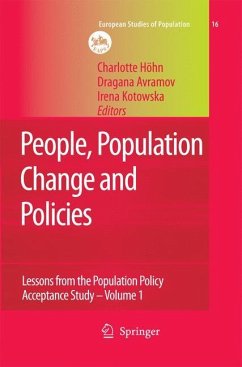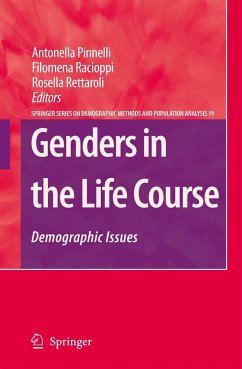
People, Population Change and Policies
Lessons from the Population Policy Acceptance Study Vol. 1: Family Change
Herausgegeben: Höhn, Charlotte; Avramov, Dragana; Kotowska, Irena E.
Versandkostenfrei!
Versandfertig in 6-10 Tagen
113,99 €
inkl. MwSt.

PAYBACK Punkte
57 °P sammeln!
This two-volume work presents social cohesion and demographic challenges that are associated with low birth rates and population ageing. It does so from the perspective of citizens and key policy actors. The work analyses peoples' attitudes about demographic trends and expectations towards private networks and public policies. It places these in the societal context of national specificities in the fourteen countries and regards them as part of the dynamics of the European integration process.Volume 1 focuses on research findings related to family issues. Its main topics are: attitudes towards...
This two-volume work presents social cohesion and demographic challenges that are associated with low birth rates and population ageing. It does so from the perspective of citizens and key policy actors. The work analyses peoples' attitudes about demographic trends and expectations towards private networks and public policies. It places these in the societal context of national specificities in the fourteen countries and regards them as part of the dynamics of the European integration process.
Volume 1 focuses on research findings related to family issues. Its main topics are: attitudes towards family and family change, value of children, fertility intentions, and views on work-family-balance. Particular attention is given to the acceptance of and expectations about family-policies. Additionally, the reader finds methodological and theoretical chapters and learns about the background of the DIALOG project.
This book is the outcome of the DIALOG research project, fundedby the European Commission under the 5th Framework Programme.
Volume 1 focuses on research findings related to family issues. Its main topics are: attitudes towards family and family change, value of children, fertility intentions, and views on work-family-balance. Particular attention is given to the acceptance of and expectations about family-policies. Additionally, the reader finds methodological and theoretical chapters and learns about the background of the DIALOG project.
This book is the outcome of the DIALOG research project, fundedby the European Commission under the 5th Framework Programme.














